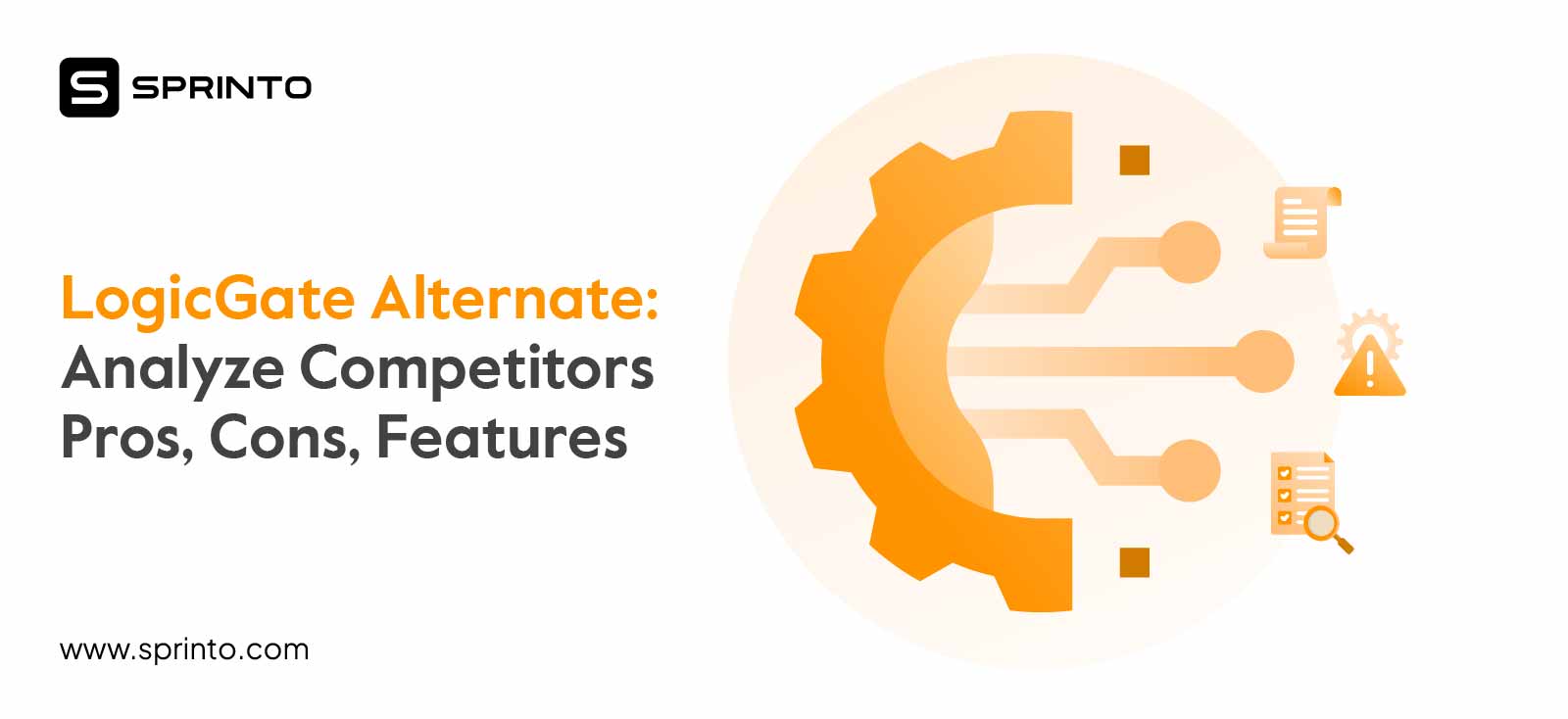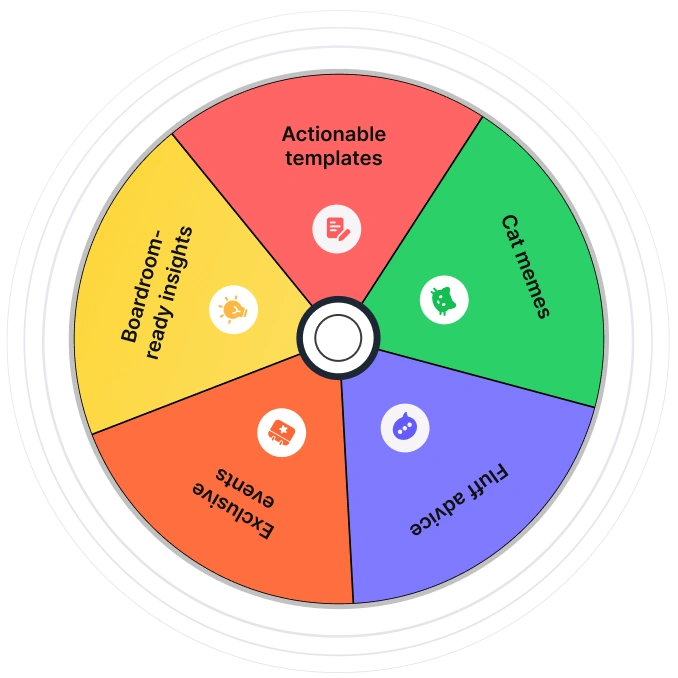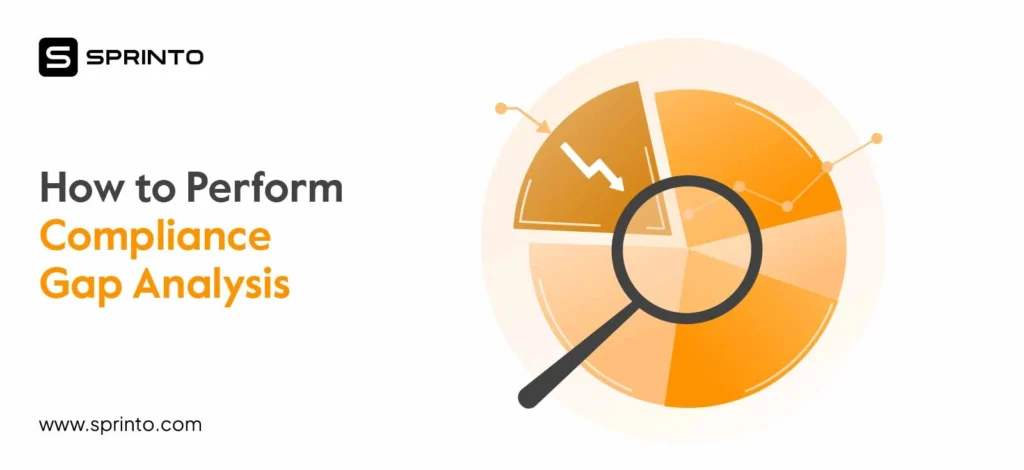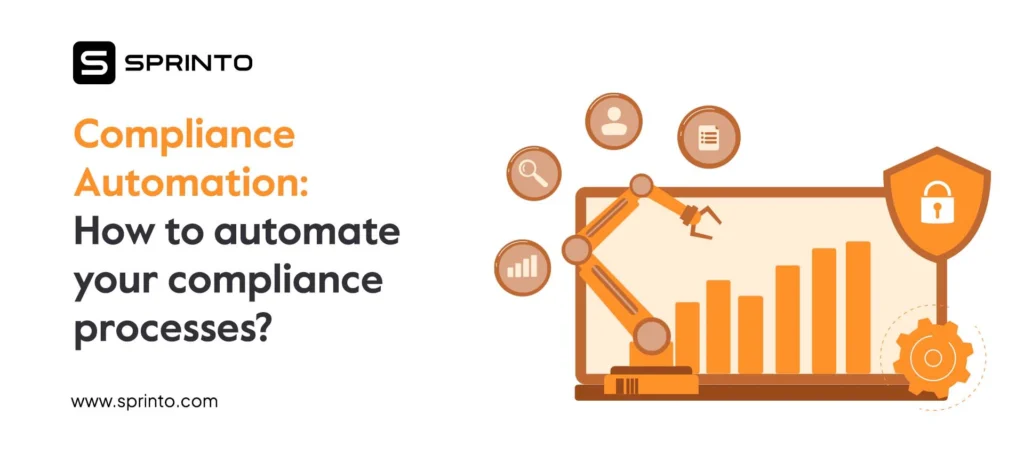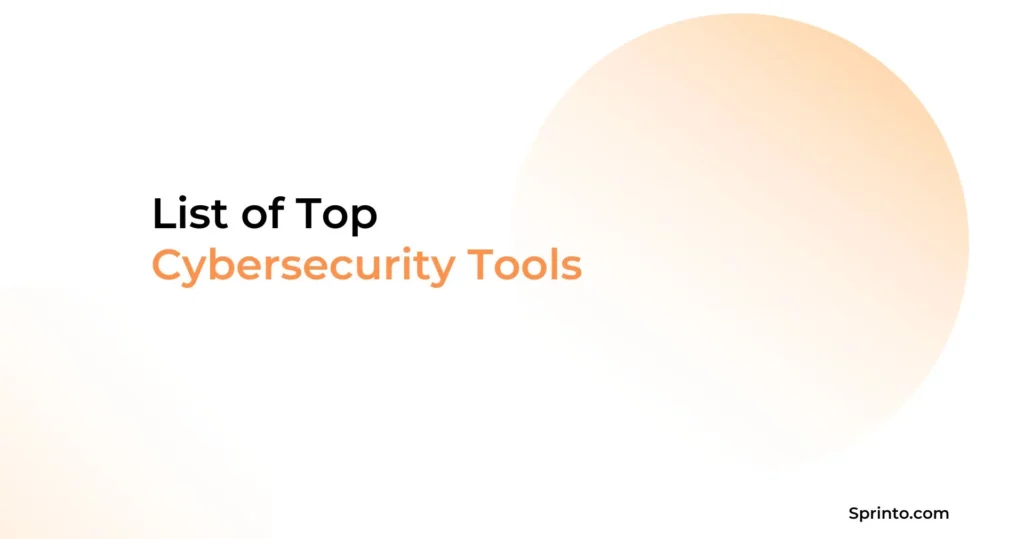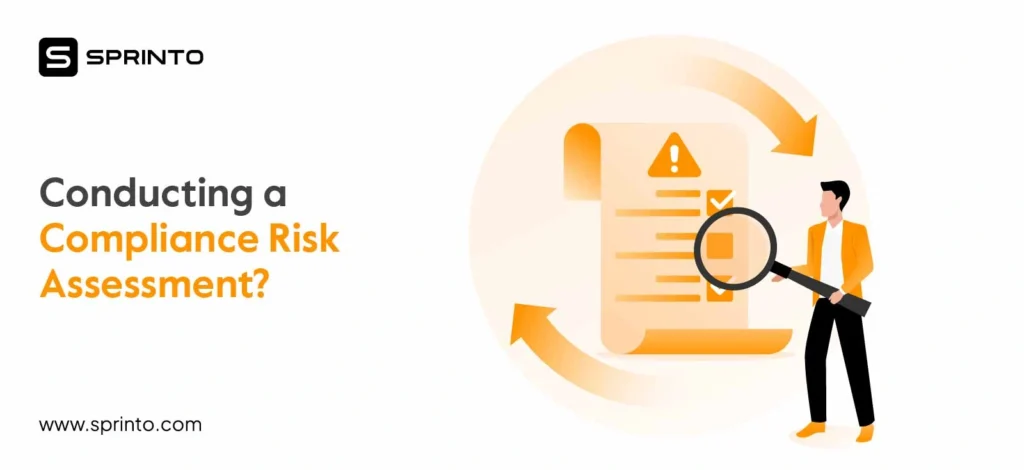For every business problem, there are multiple products with a solution. Often, it creates more problems than it solves for – the benefit is competitive prices and the option to switch to a competitor, while the disadvantage is choice overload. If you are looking for a LogicGate alternative, it is only logical to know the good, the bad, and the okay of their competitors before making a decision.
This article aims to solve analysis paralysis using feedback from real users.
What is LogicGate?
LogicGate combines governance, risk, and compliance into a single integrated platform. It helps users scale by using a single integrated platform, and automate manual processes to improve efficiency across risk assessment, compliance reporting, and policy enforcement.
LogicGate helps to build trust with investors by measuring, tracking, and reporting on ESG programs. Users can prepare, manage, and respond to crises.
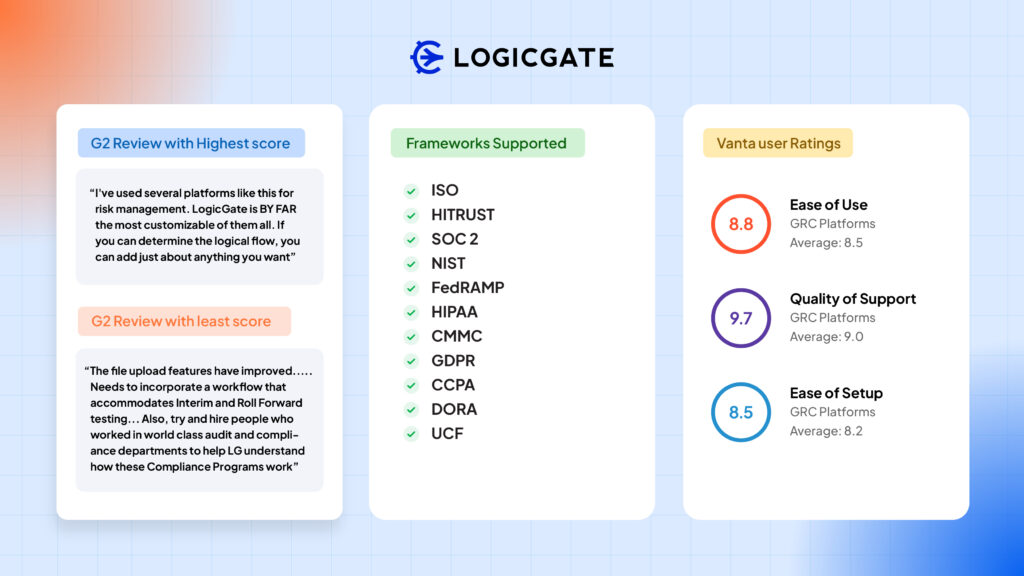
Key features and capabilities include:
- Deeply customizable risk cloud helps to build organization-specific programs
- The visual reporting builder allows users the flexibility to visualize important information using custom home screens
- Build, develop, and launch clean workflows based on existing processes. Add and tailor any steps using the zero coding tool without assistance from the IT support team
- Simple and user-friendly interface that enables novice users to set up custom workflows
- Integrates easily with existing systems to eliminate silos and enhance visibility across functions
LogicGate offers custom pricing plans based on the size of the organization, the security maturity of the program and other factors. You can choose the applications required for the GRC program and purchase power user licenses for people who are involved in the GRC program. The basic features are included with the package and any additional features need to be purchased. You can request for LogicGate pricing from here.
Why should you look for a LogicGate alternative?
LogicGate’s deep customization abilities enable users from a non-technical background to set up workflows unique to their requirements. However, a quick analysis of G2 reviews shows that the positive feedback is limited to customization abilities. Additionally, the common concerns associated with the product include:
Cons:
- Lacks useful reporting functionalities like filter data by date and advanced visual insights
- The vendor assessment tool has minor bugs like questionnaires showing blank in consecutive steps even after completing
- The workflows, despite being highly customizable are not always intuitive, like the lack of a back button to edit previous pages
5 Best LogicGate Competitors (Compared by Features & Reviews)
While LogicGate is a renowned name in the industry, there are some equally good alternatives in the market. We have curated the top 5 alternatives and competitors of LogicGate.
Sprinto (Book a free 1:1 demo)
Sprinto is one of the most preferred alternatives for LogicGate as it is a simple but powerful compliance and security automation platform. The platform consolidates risks and controls to offer a centralized view of compliance.
It maps risks and controls to standards, individuals, and systems to drastically reduce compliance coordination efforts.
Sprinto’s pre-built platform offers end-to-end support required to implement a compliance program, track progress, and complete audits to save time and reduce effort.
Sprinto vs Logicgate
| Sprinto | Logicgate | |
| Ease of use | Customers find Sprinto’s UI user-friendly and the platform easier to set up G2 rating: 9.2 | Customers attach a learning curve to LogicGate’s platform and find it a little difficult to use G2 rating: 8.8 |
| Supported frameworks | 20+ compliance frameworks such as SOC 2, ISO 27001, HIPAA, PCI DSS and any custom framework management | 20+ frameworks such as ISO 27001, SCF, HITRUST, PCI DSS and more |
| Who is it suitable for? | Sprinto is the category leader in small businesses and mid-market compliance management | LogicGate is best suited for Enterprise Risk Management and can be pricey for small and mid-sized businesses |
| G2 reviews | 850+ reviews | 150+ reviews |
Advantages
Maps common controls across frameworks to save duplicate efforts and enable teams to kickstart compliance program
Monitors controls in real-time via automated checks and custom workflows to ensure continuous compliance
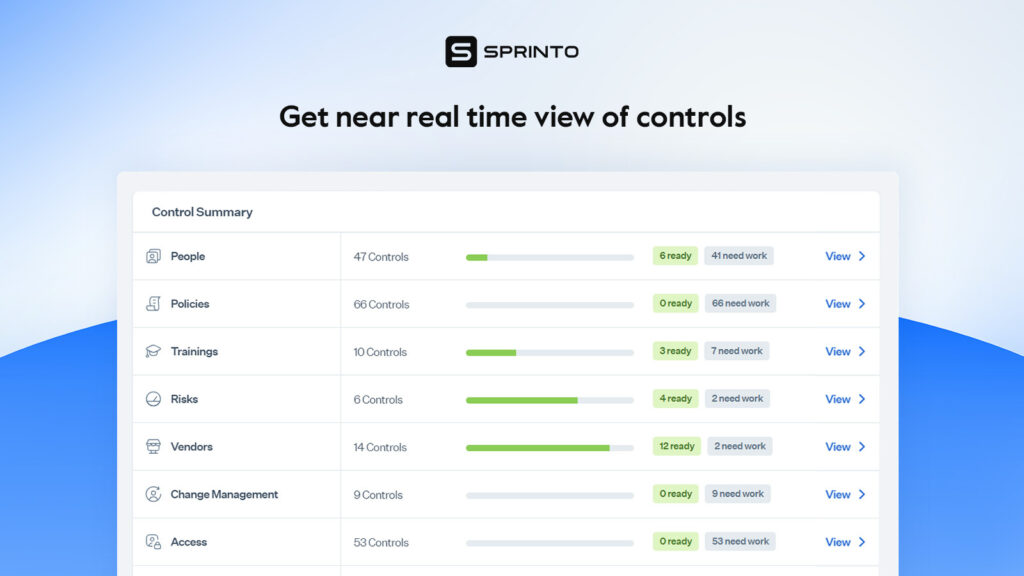
Integrates with the cloud environment to aggregate risks into a single console to offer a holistic view of risks, controls, and events.
Collects evidence in an audit-friendly way, requiring little to zero intervention from the team
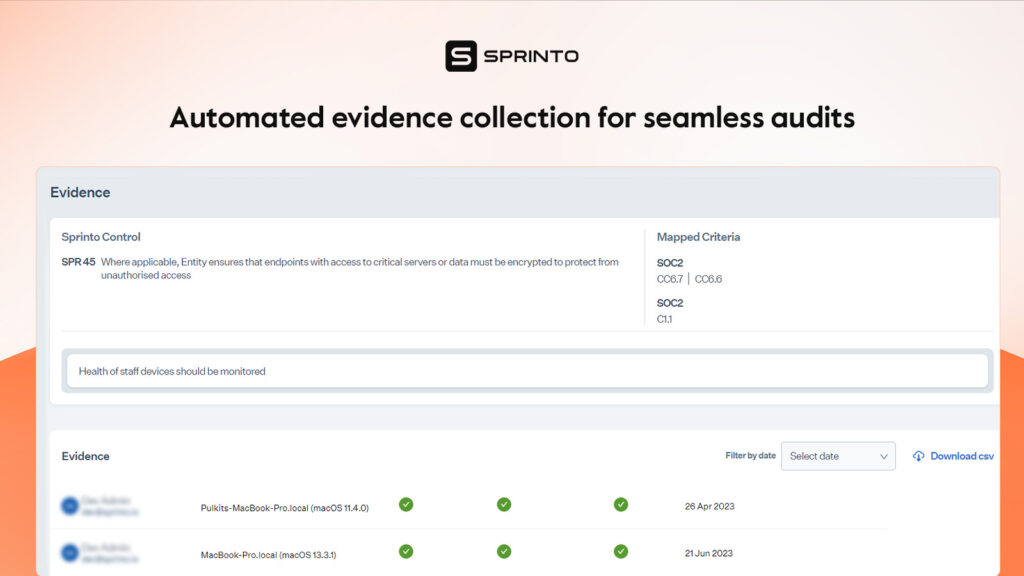
Quickly and efficiently delivers results for key compliance tasks across standards using highly customizable workflows
The vendor dashboard enables users to classify data exposed to vendors based on the level of risk
Pre-built policy and process documentation and security modules cover non-technical components of compliance
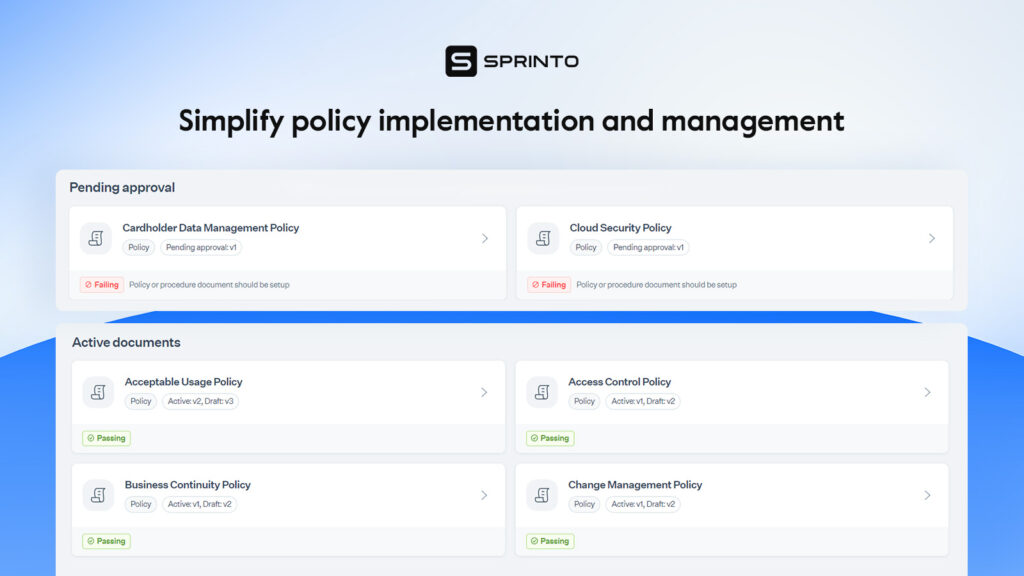
Startup-friendly pricing structure such as the ignite model helps to scale without stretching the budget
Triggers notification on non-compliance activities to the right team member with content and expert-recommended suggestions for remediation to quickly resolve and ensure continuous compliance
Disadvantages
- Built specifically for cloud-based companies, it is not suitable for on-premise organizations
- New updated pushed to the tool on a regular basis may be overwhelming for existing users
Drata
Drata automates security and compliance to make businesses audit-ready.
It integrates with 75 common applications to collect evidence, launch compliance programs for multiple frameworks without building overlapping controls, continuously monitors compliance status, and allows users to assign roles to each control or policy.
Drata’s startup program helps businesses scale their compliance project using beginner-friendly programs and expert support.
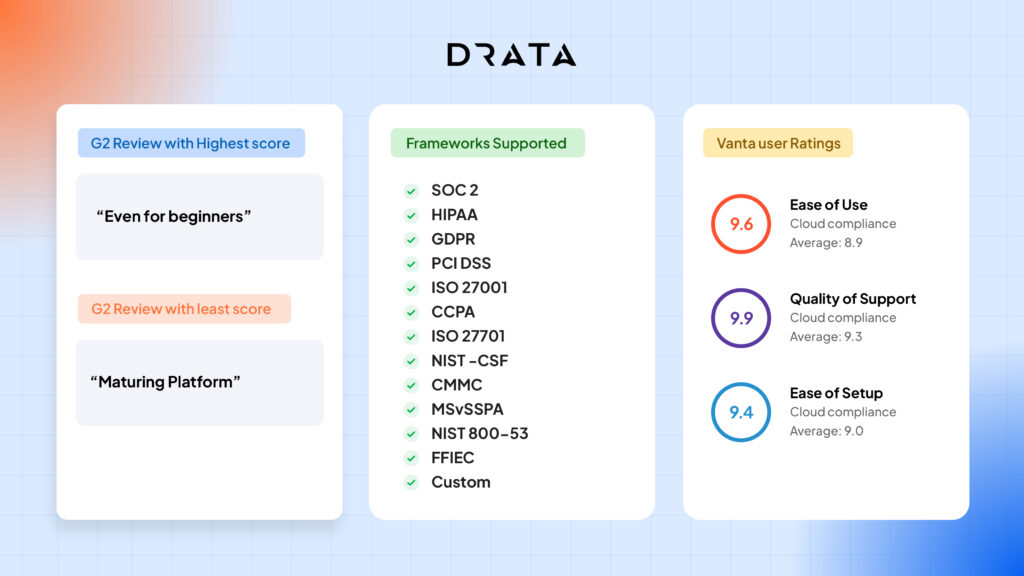
Drata vs Logicgate
| Drata | LogicGate | |
| Ease of setup | Customers have rated Drata 9.2 for ease of setup | LogicGate is a little complicated to set up and has a rating of 8.5 |
| Key Features | Continuous control monitoring, automated evidence collection, customized risk programs, audit hub etc. | Enterprise risk management, automated workflows, automated evidence collection, visual reports etc. |
| Supported Frameworks | 20+ frameworks including SOC 2, ISO 27701, HIPAA, GDPR etc and custom frameworks | 20+ frameworks such as ISO 27001, SCF, HITRUST, PCI DSS and more |
| Who is it suitable for? | Drata is suitable for small and mid-sized businesses | LogicGate is best suited for Enterprise Risk Management and can be pricey for small and mid-sized businesses |
| G2 reviews | 700+ reviews | 150+ reviews |
Advantages
- The control compliance dashboard helps users proactively resolve action items, gain real-time visibility into issues, and meet compliance requirements
- User friendly, intuitive, and responsive platform helps offers robust features to enable users to navigate through the dashboard with ease
- The support team proactively resolves issues and is highly responsive to ensure customer success
- The TrustCenter simplifies the process of accepting NDAs and downloading SOC 2 reports
- The audit hub facilitates direct access with external auditors to easily view evidence and streamline the auditing process
Disadvantages
- Users reported some functionalities of the policy management system are clunky
- Some features of the system are not auto monitored such as mapping remediation to controls, required manual intervention
- Lack of transparent communication on add on features may create post-sales surprises by stretching the user’s budget
- The policy management feature lacks advanced features to facilitate more customization
Find out why Sprinto is better than others
Vanta
Vanta automates security and privacy frameworks like SOC 2, ISO 27001, HIPAA, and more to help organizations build, scale, and manage these projects and get audit ready.
It enables IT teams to know the security posture through continuous monitoring, surfaces risks across assets and vendors using pre-built integrations, and helps to streamline audit processes by reducing auditor back and forth.
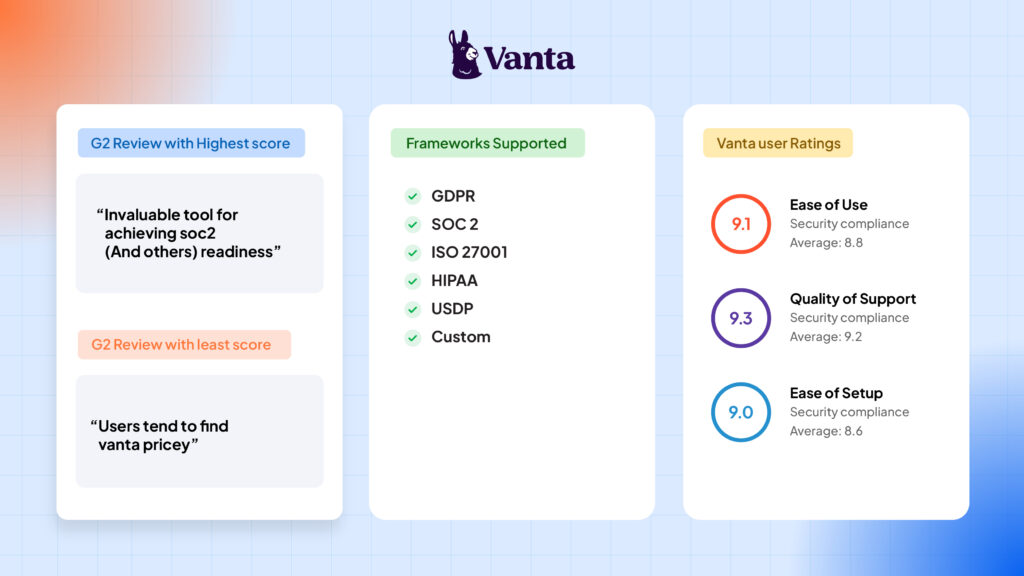
Vanta vs Logicgate
| Vanta | LogicGate | |
| Ease of setup | Vanta has a steep learning curve attached to it and users find it complicated as compared to LogicGate G2 rating:8.8 | Customers find LogicGate easier to set up and use. G2 rating: 9.0 |
| Key Features | Policy templates, inventory management, gap assessments, RBAC, continuous monitoring etc. | Enterprise risk management, automated workflows, automated evidence collection, visual reports etc. |
| Supported Frameworks | 20+ frameworks such as SOC 2, HIPAA, GDPR, ISO 27001 and custom frameworks | 20+ frameworks such as ISO 27001, SCF, HITRUST, PCI DSS and more |
| Who is it suitable for? | Vanta is suitable for organizations of all sizes | LogicGate is best suited for Enterprise Risk Management and can be pricey for small and mid-sized businesses |
| G2 reviews | 1000+ reviews | 150+ reviews |
Advantages
- The intuitive, easy to navigate, and user-friendly platform simplifies workflows and helps IT teams gain visibility into security concerns
- Users mention that the support team is helpful, offers tailored advice, and offers guidance throughout the onboarding process
- Helps organizations become audit-ready by offering templates, controls, risk registers, and more tools to maintain and achieve compliance
- Offers automation capabilities that streamline tasks, process, and continuously monitors systems to ensure compliance through minimum manual efforts
Disadvantages
- The lack of modularity is a roadblock to transferring SOC 2 work to other programs
- Users noted that certain features and modules like templates for PCI and HIPAA, Azure support, vendor management and risk modules are missing
- Some users found navigating through the platform features to be overwhelming and disorganized
- Users noted some challenges with the integration system and required more manual effort than desired
- The platform is over-indexed for simplicity and platform lacks the desired level of granularity to drive smoother audits
AuditBoard
AuditBoard centralized organizational risks, controls, frameworks, and policies to boost collaboration, improve workflow efficiency, and use risk insights to drive decision-making.
It facilitates internal control compliance management, simplifies audit activities from a single console, and efficiently optimizes resources.
AuditBoard vs Logicgate
| AuditBoard | LogicGate | |
| Ease of setup | Users find Auditboard easier to use but challenging to setup G2 rating: 9.0 | Users find LogicGate easier to setup but less user-friendly as compared to Auditboard G2 rating: 8.8 |
| Key Features | Automated workflows, third-party risk management, reporting, Real-time control monitoring etc. | Enterprise risk management, automated workflows, automated evidence collection, visual reports etc. |
| Supported Frameworks | 10+ frameworks such as NIST, SOC 2, CCPA, FedRAMP, HIPAA etc. | 20+ frameworks such as ISO 27001, SCF, HITRUST, PCI DSS and more |
| Who is it suitable for? | Auditboard is best suited for large enterprises | LogicGate is best suited for Enterprise Risk Management and can be pricey for small and mid-sized businesses |
| G2 reviews | 900+ reviews | 150+ reviews |
Advantages
- The risk management system enables teams to make data-backed decisions, conduct risk assessments, and manage enterprise risks
- Simplifies control activities from a centralized dashboard such as tracking progress, discovering gaps, connecting controls to frameworks, and establishing accountability
- The platform is user-friendly and intuitive, enabling teams to navigate and configure items effortlessly
- Enable users to manage, track, and implement auditing activities like control configuration, documentation, and more from the SOX hub
Disadvantages
- Users were unable to leverage the risk assessment feature to connect to ERP or upload formatted financial reports
- The AuditBoard sync tool does not support viewing or uploading multiple files. Additionally, users faced issues like timeout and lost work in the process
- The set process is time-consuming and has a learning curve
- Does not facilitate scheduling quarterly audits and assignments
Implement customized controls with Sprinto
Secureframe
Secureframe helps businesses achieve and maintain SOC 2, ISO 27001, PCI DSS, HIPAA, GDPR, CCPA, and NIST compliance.
It runs automated tests, trains employees, creates readiness reports, continuously monitors the ecosystem, manages asset inventory, and assesses vendor risks.
Secureframe’s trust center helps to grow confidence through transparency, respond to security questionnaires, and manage document requests.
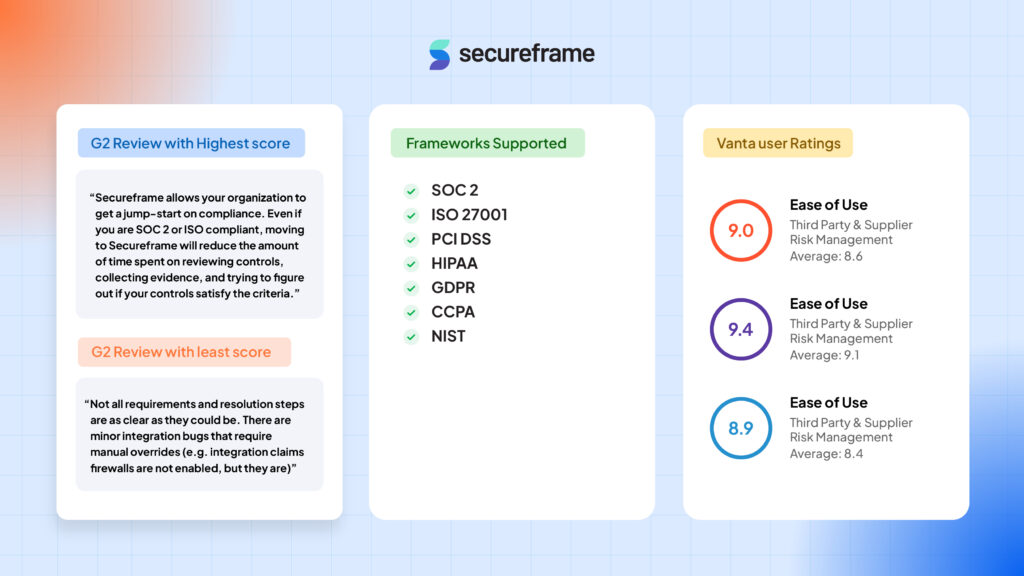
Secureframe vs LogicGate
| Secureframe | LogicGate | |
| Ease of setup | Users find Secureframe to be more intuitive and straightforward G2 rating: 9.0 | LogicGate is less easy to operate as compared to Secureframe G2 rating: 8.8 |
| Key Features | Continuous monitoring, security training, remediation guidance, vendor management etc. | Enterprise risk management, automated workflows, automated evidence collection, visual reports etc. |
| Supported Frameworks | 20+ frameworks including SOC 2, PCI DSS, HIPAA, CMMC and custom frameworks | 20+ frameworks such as ISO 27001, SCF, HITRUST, PCI DSS and more |
| Who is it suitable for? | Secureframe is best suited for small businesses but also caters to enterprises | LogicGate is best suited for Enterprise Risk Management and can be pricey for small and mid-sized businesses |
| G2 reviews | 300+ reviews | 150+ reviews |
Advantages
- Helps to organize compliance checks by clearly mapping controls to tasks
- Runs automated scans for compliance requirements on key platforms by polling necessary information
- Easily integrates with popular applications and existing systems to streamline operations
- Provides a comprehensive overview of policy health using the “Tests” feature
- The support team is helpful, knowledgeable, quickly resolves issues, and offers business-specific solutions
Disadvantages
- Does not trigger notifications for failing tests to control owners
- Certain UI elements are buggy. Users reported deleted accounts appearing without clarification
- Lacks the capability to align requirements with security standards using a suggested option to eliminate non-applicable requirements
- Does not offer adequate integration, leading to manual intervention
Hyperproof
Hyperproof uses automation to create a unified view of risk and compliance and enables streamlined workflows to remove any guesswork from operations.
It features 70+ integrations to automate evidence collection across cloud services, helps create and test custom controls and facilitates audit management for a range of compliance frameworks.
Hyperproof Vs LogicGate
| Hyperproof | LogicGate | |
| Ease of use | Users find Hyperproof’s UI easy to navigate and less clunky G2 rating: 9.1 | LogicGate is less easy to operate as compared to HyperproofG2 rating: 8.8 |
| Key Features | Custom controls, risk registers, vendor management, audit management etc. | Enterprise risk management, automated workflows, automated evidence collection, visual reports etc. |
| Supported Frameworks | 100+ frameworks including CCPA, PIPEDA, FedRAPM, FERPA etc. | 20+ frameworks such as ISO 27001, SCF, HITRUST, PCI DSS and more |
| Who is it suitable for? | Hyperproof is best suited for mid-market segment | LogicGate is best suited for Enterprise Risk Management and can be pricey for small and mid-sized businesses |
| G2 reviews | 90+ reviews | 150+ reviews |
Advantages
- Supports role-based access permissions to ensure privacy and security of critical data
- Promotes collaboration internally across functions and with external stakeholders
- Features a ‘calendar of compliance’ to break down repetitive compliance tasks and stay on top of the adherence requirements
- High-quality assistance from the support team
- Helps maintain a single source of truth for vendors and facilitates automated assessments
Disadvantages
- The number of integrations supported are limited as compared to the competitors
- The initial training and set up for the tool can take some time
- The tool experiences occasional bugs and responsiveness issues which can lead to inconsistent performance
- There is a scope for automation and improvements in the reporting functionality
OnSpring
OnSpring integrates governance, risk and compliance to offer centralized visibility and facilitates better alignment of these functions with business processes.
The versatile platform helps automate risk assessments, facilitates compliance frameworks and control testing and track performance on the reporting dashboards.
OnSpring Vs LogicGate
| OnSpring | LogicGate | |
| Ease of use | OnSpring is straightforward and intuitive as compared to LogicGateG2 rating: 9.4 | LogicGate is less user-friendly as compared to OnSpringG2 rating: 8.8 |
| Key Features | No-code workflows, real-time reports, surveys, task management, access controls etc. | Enterprise risk management, automated workflows, automated evidence collection, visual reports etc. |
| Supported Frameworks | 8+ frameworks including NIST, ISO, HITRUST, CMMC etc. | 20+ frameworks such as ISO 27001, SCF, HITRUST, PCI DSS and more |
| Who is it suitable for? | OnSpring provides GRC suite for enterprise clients | LogicGate is best suited for Enterprise Risk Management and can be pricey for small and mid-sized businesses |
| G2 reviews | 40+ reviews | 150+ reviews |
Advantages
- No-code platform with sufficient training material for the administrators
- Facilitates cyber and financial monitoring of third-parties to assess their criticality
- Offers solutions for multiple industries and use cases
- Features an internal audit software for actionable insights before the external audit
- Makes it easy to maintains documents and present reports with the help of dynamic docs
Disadvantages
- Too many attributes attach a learning curve to the product
- LImited out-of-the-box integrations
- The reports are less comprehensive
- There are minor glitches and intermittent issues with the tool
Sprinto: The smartest LogicGate alternative
Choosing a new GRC platform can feel overwhelming—every tool claims to be all things to all people. But here’s what makes Sprinto stand out as the better choice over LogicGate:
- Faster time to value: With Sprinto’s out-of-the-box frameworks, pre-built templates, and expert onboarding, you can begin enacting compliance in weeks, not months.
- Comprehensive framework support + overlap mapping: Sprinto lets you manage 20+ compliance frameworks (SOC 2, ISO 27001, HIPAA, etc.) and maps common controls across them to reduce duplicate effort.
- Automation & audit readiness: Real-time control monitoring, automated evidence collection, and tools to collaborate with auditors help reduce manual effort.
- Better pricing & support: Sprinto tends to offer more predictable and startup/mid-market-friendly pricing. Also, one-on-one guidance and responsive expert support help you through the setup, which many users prefer over steeper learning curves.
If you’re looking for a platform that combines speed, clarity, broad framework coverage, and strong support—Sprinto delivers.
See Sprinto in action. Book a demo
Disclaimer: The information on this page is based on independent research conducted by our team and on insights gathered from publicly available, user-first review platforms such as G2. We have summarized feedback to highlight commonly mentioned strengths and areas for improvement. While we strive for accuracy and balance, user experiences may vary, and we encourage readers to review the original sources for the most up-to-date feedback. This article was last updated in September 2025.
FAQs
Among LogicGate alternatives, Sprinto leads in automation, handling evidence collection, control monitoring, and audit readiness with minimal manual effort. Its continuous compliance tools keep your frameworks up-to-date, saving time and reducing errors compared to other alternatives.
Sprinto offers transparent, budget-friendly plans suitable for small to mid-sized teams, including templates, automation, and support. LogicGate’s modular pricing can be higher, with extra costs for implementation and advanced features. Sprinto provides a cost-effective alternative without compromising functionality.
Many teams find LogicGate complex and time-consuming to implement, often requiring external consultants to manage and scale compliance effectively. The platform can feel overwhelming for lean teams, and costs can add up as additional modules and services are needed. These challenges often lead businesses to explore simpler, more automated alternatives.
Sprinto is designed to be intuitive and automation-first, helping teams get audit-ready faster without relying on consultants. It supports multiple compliance frameworks in one platform and continuously monitors controls and evidence, reducing manual effort. It is widely appreciated for how easy it is to scale compliance while staying audit-ready.
Yes, Sprinto offers migration support to securely transfer your existing compliance data, policies, and evidence. Our team ensures a smooth transition so you can continue managing compliance without starting from scratch.
Anwita
Anwita is a cybersecurity enthusiast and veteran blogger all rolled into one. Her love for everything cybersecurity started her journey into the world compliance. With multiple certifications on cybersecurity under her belt, she aims to simplify complex security related topics for all audiences. She loves to read nonfiction, listen to progressive rock, and watches sitcoms on the weekends.
Explore more
research & insights curated to help you earn a seat at the table.



